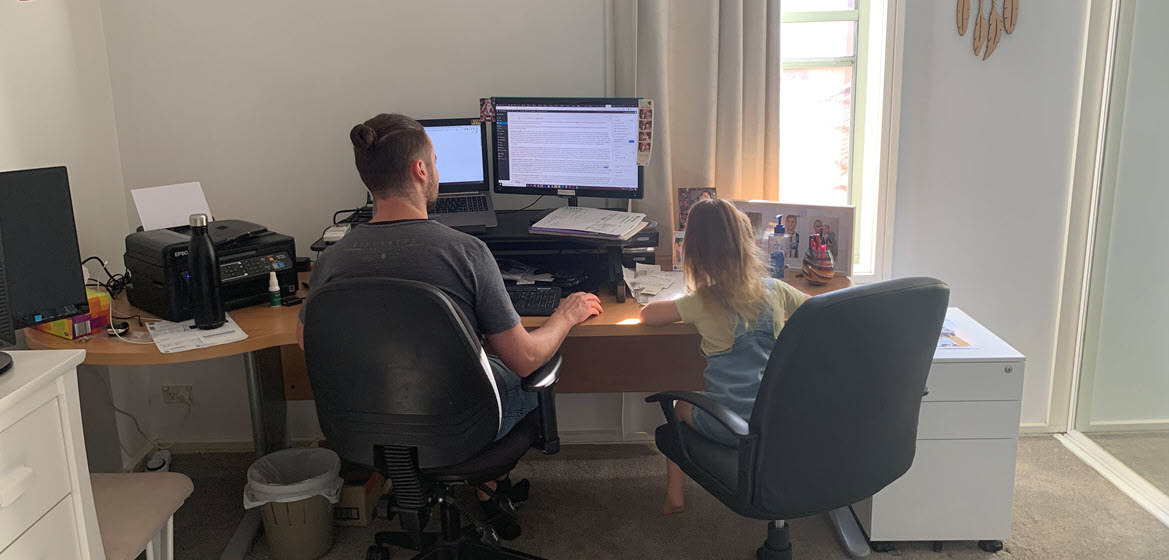What a time to be in business!
In a matter of weeks, the global economy has spiralled downwards due to the COVID-19 pandemic, and tragically thousands of businesses; small, medium and large alike, across numerous industries, have been brought to their knees right across the country. It’s the same story in almost every nation around the world.
Thankfully, the Australian government is providing quite a bit of financial assistance to help businesses and employees who are suffering, so that when this pandemic eventually passes and normality begins to return, our economy can start to recover.
That to the side for a moment, I personally believe that right now is a great time for businesses to look for areas of improvement within their organisation. Here’s a few opportunities that I’m personally really excited about.
Working from home – This is a big one for me. As someone working in the digital space, running a small business and also raising a young family, working from home is something I’ve been a HUGE believer in for many years now. Our team at Code Brewery has largely adopted a “remote” way of working for the better part of 5 years now, and I wouldn’t change it for the world. When done properly with the mindset and the right tools in place to help manage your team and keep everyone connected, working from home can be a huge blessing. It allows employees to have a better work/life balance. For people like myself who work long hours, this means that I don’t have to leave for work before my kids wake up and then arrive back home once they are already in bed. It means I can stop for short breaks to spend time with my family, or duck out to take my kids to their extracurricular activities etc. These are priceless moments for me that I’ll never be able to get back if I missed them, and I know many of my team with their own young families feel the same. Yes it requires discipline and focus, but if you can manage that well, then there is absolutely no reason why you can’t be just as productive (if not more productive) as you would be in a traditional office environment. Some tips for ensuring you remain focused when working from home; get out of your pyjamas – this will put you in the mental state ready for work rather than for slothing around, avoid working from the kitchen bench or dining table which can be noisy and disruptive environments, try to set up a dedicated office space in your home (ideally a separate room with a lock on the door) that replicates your optimal work environment setup such as having dual monitors and a comfortable office chair, and perhaps most importantly ensure that there is no TV in viewing range!
Flexibility in work hours – By breaking free of the traditional office environment, businesses are also enabling themselves to break the mould of the 9-5 (or is it 8 – 6?) work day model. I’ve never read any convincing evidence that those hours are the best hours of the day to be productive. Obviously for certain industries or job roles, the 8am – 6pm window is the most effective time slot for them, but that is definitely not the case for everyone. In a software development studio for example, I understand that some of my team are night owls and prefer to have a bit of sleep in and then crack on with work in the afternoon and evenings, whilst others like to get up early and get through the bulk of their work in the morning. And why not allow this flexibility? Why not allow a staff member to complete an 8 hour workday over a 12 hour period (or longer), allowing them the flexibility to do the school drop off / pick-up, go to appointments, take a break to spend time with their families or work on their fitness and mental health? If this flexibility makes your employees more productive and happier without negatively impacting your business, then you’d be failing as a manager to try and force them to work differently. There are loads of great time tracking tools out there such as Toggl, Time Doctor and HubStaff that you can utilise to ensure that your team is actually putting in the hours required. So make the most of this opportunity to give your team flexibility to work around their lives, and if you can effectively manage them, your business will be the greatest beneficiary of this new flexible structure.
Forcing businesses to embrace digital – Although most businesses have a website and/or a presence across different social platforms, many businesses have still not fully embraced the power of becoming a digitally optimised business. What do I mean by being a “digitally optimised business” (and no, I’m not trying to create a new buzz term here)? I mean by using tools to improve company processes and workflow, and to enable staff to do their jobs more efficiently and effectively. Using communication tools such as Skype and Slack; video conferencing tools such as Zoom, GoToMeeting and Google Hangouts Meet; project management tools (rather than trying to PM via email; a personal pet hate of mine) such as Jira, Basecamp, Trello, Teamwork, Monday and Milanote (which is a great tool I’ve only recently come across, used for organising creative projects into beautiful visual boards); resource sharing tools such as Google Drive, Google Classroom, Dropbox, WeTransfer and Hightail, Customer Relationship Management (CRM) software such as Salesforce, HubSpot or Microsoft Dynamics to properly manage leads and customers accounts,… the list goes on. There are so many great digital services out there to help businesses do better business – now is as good a time as ever to get familiar with some of them and adopt a few. If I can teach my 64 year old mother how to have a Skype video conference with her clients (saving her hours in travel), then anyone can benefit from adopting more digital services in their workplace!
Reducing costs and being wiser with your hard earned money – There’s nothing that will make you re-evaluate how you spend your money like getting caught up in a global financial crisis and losing 50%+ of your business virtually overnight. As a business owner, this is a great time to ask yourself questions like; Do we really need a fancy expensive office in the middle of the CBD? Are we spending our marketing budgets wisely or just for the sake of spending them? Can we save money by streamlining our processes and making better use of our employees’ time? Reducing your overheads will not only increase company profit margins, but can also enable you to pass on the savings to your clients and make you more cost competitive in the market, or pass on the savings to your employees. That’s a win-win-win… right? This is something that as business owners we should always be asking ourselves, but if you haven’t posed these questions for a while, then now’s a great time for it.
Diversifying your offering – This is a great opportunity to look for areas of growth, and many entrepreneurs will be taking advantage of quieter times to see how they can diversify their business services to accommodate for our current economic and socially-distanced climate, and also bring in additional revenue in the future. Restaurants/cafes that previously offered a purely dine-in service are now offering take-away and delivery. Breweries have switched from alcohol to hand sanitiser. F1 engineers have switched their focus from engines to building breathing apparatus. Schools, Personal Trainers, and other class based businesses are taking their services online… and the list goes on! If you’ve had an idea brewing away for a while but never had the time to work on it, perhaps now is that time?
Environmental and social benefits – Believe it or not, the conditions we’ve been forced into are also helping businesses become “greener”. By shutting office doors and turning off the lights, not only are you saving electricity, but you’re doing much more for the environment. You’re reducing pollution by the fact that your employees don’t need to drive or take public transport to work. Less people driving results in a reduction of traffic congestion, meaning our roads are becoming more time efficient (hence reducing petrol fumes further) and drivers are arriving at their destination sooner and happier. You’re also enabling employees to move away from congested cities into more remote areas if they have a completely “work from home” set up. This dispersion of where people can live will also mean that (over time) property prices in heavily populated cities may come down (or at least increase at a slower rate) as there will be less demand. The same will apply for office space. With less demand for office space in cities, prices will come down and buildings/areas that were previously centres of business can be converted into residential areas, providing more options to home buyers. It really is a domino effect that has many more ongoing benefits for us socially and environmentally.
Bringing out the best in humanity – Although we’ve seen the media report on some ugly things, such as fights in the toilet paper isles at local supermarkets (*humanity facepalm), there are countless more stories about wonderful acts of kindness taking place. Neighbours looking out for each other, supermarkets donating more than ever to the disadvantaged, businesses offering their services for free or for heavily discounted rates to help out other businesses/people in need and countless more examples. I have been really touched by some of the acts of kindness that I have seen and heard about during this time, and am doing my best to be part of this kindness movement too.
It’s my hope that within a few months’ time, many businesses will emerge from the COVID-19 disaster, and will be reinvigorated and potentially reinvented with a new approach to how they work. More people will be working from home than there were BC (“Before COVID-19” ;P), which will improve work/life balance, mental health and many other factors like a reduction in pollution levels and traffic congestion. Businesses will be diversifying into new markets or with new offerings, meaning more jobs can be created as well.
So with all of the doom and gloom we are currently facing, I am still optimistic that there is a silver lining for those who can remain afloat and be productive during this time.





